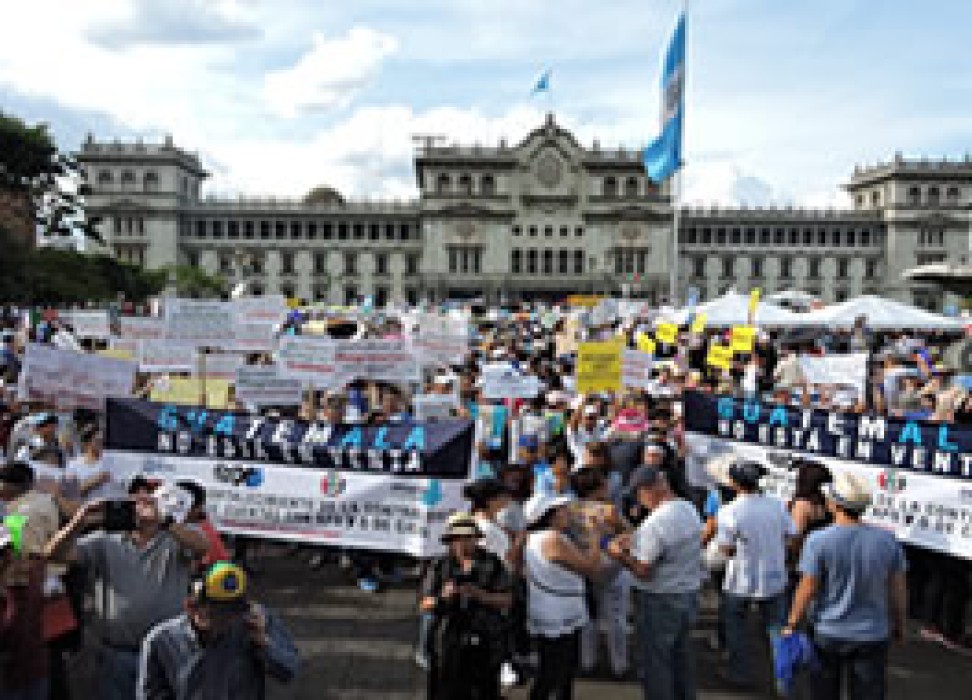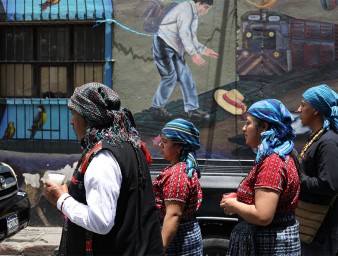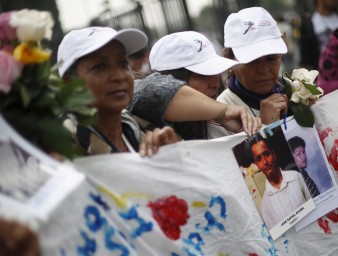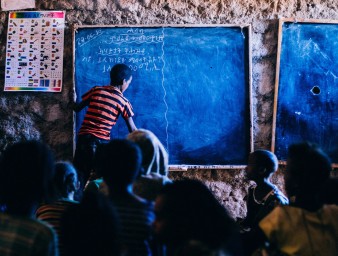A Guatemalan awakening: the revolt for justice and change
08 June 2015

Protests started after the Public Prosecutor’s Office and the International Commission against Impunity (CICIG) unveiled, on 16 April 2015, a customs fraud and smuggling scheme implicating several high-level officials, whose operations defrauded about 320,000 USD (2.5 million quetzals) each week.
One month later, another investigation carried out by the Public Ministry and CICIG revealed a case of corruption in a USD 14 million (116 million quetzals) contract granted by the Guatemalan Social Security Institute to provide dialysis services. In this same case, investigations continue as several patients died presumably because they did not receive adequate treatment.
“Corruption is not new, but it has grown to reach an extremely high level. We are fed up,” said an engineer participating in the protest with his family.
“If we do not express ourselves, no one else will, and everything will remain the same. Perhaps these protests will not change the reality of the country, but we have to show everyone, in Guatemala and the world, our deep dissatisfaction,” pointed out his daughter.
What started as a peaceful movement on 16 April organized through social media using the hashtag #RenunciaYa (Resign Now) and involving mainly diverse groups from the capital has grown to encompass people from all the country and sectors of society: families, students, women, indigenous groups, LGBTI people, children, persons with disabilities, older persons, urban and rural people, who have been peacefully protesting every week in front of the Presidential Palace in Guatemala City and throughout the country. Even Guatemalans living abroad joined in on the dissent.
“This is a peaceful, non-political movement. Our intention is to continue with the public demonstrations, and that people develop a sense of ownership of this process. We want to build a democratic space where society can organize and debate,” said one of the first organizers of the protests. He highlighted the involvement of university students, who organized to participate in the mass meetings.
Protesters went beyond a call to fight corruption to demand the resignation of government authorities and the restitution of public funds. In a country where 53% of the population live in poverty and one in two children under the age of five suffers malnutrition, people want a transparent use of the State’s budget to guarantee basic rights such as food, health and education. Three months before the general elections, discontent at the political class is also a recurrent theme on protest signs.
Because of the citizens’ demands, public pressure and media coverage of other alleged corruption cases, several ministers and high level authorities, including the vice-president, have stepped down. Amidst the deepest political and institutional crisis in decades, Guatemalans are aware that only integral reforms will yield genuine change for their country.
“People are saying “we do not want this system.” The movement is generating a space for dialogue that did not exist before. I think we will see proposals emerging from different sectors,” said human rights defender, Alejandra Castillo.
The UN Human Rights Office in Guatemala, accompanied by the the national Human Rights Ombudsman Office, has monitored the protest and in particular the exercise of the right to free assembly and expression.
The Office is also monitoring the situation of human rights defenders asking for change and justice, as well as journalists who are key in providing independent, pluralistic and researched information in this crucial context.
Moreover, as part of the technical advice it provides to the Congress and civil society, the UN’s rights office has engaged in the analysis and discussion of a set of priority reforms to strengthen the judiciary, promote transparency in the use of public funds, and improve regulations on campaign financing.
“This is a decisive moment for Guatemala. The people have the opportunity to build a participatory, inclusive process to implement the reforms they demand, many of which were recommended by the High Commissioner in his annual reports,” said Alberto Brunori, Representative of the UN Human Rights Office in Guatemala.
“Human rights must be right at the forefront of the solutions to those demands. The Office will continue accompanying the process and providing technical assistance, both to the State and to civil society, to ensure that the reforms comply with international standards,” he added.
Although Guatemala faces several challenges to fulfill protesters’ demands, the spirit of Guatemalans is not the same as it was two months ago. A change has begun.
“From what I saw in the last protest I think society won’t to keep silent. It’s a citizen movement that will continue growing,” said one of the organizers.
And participants agree with him. “We are a new generation that grew up without the fear our parents had [due to 36 years of armed conflict],” says a young student accompanying her family. “We are a generation eager to raise our voices. We are the ones who triggered change,” she concluded.
8 June 2015



